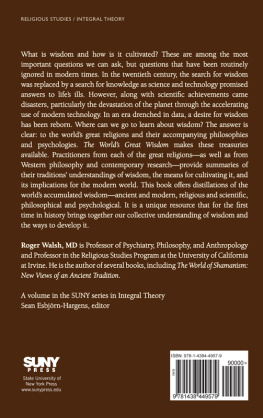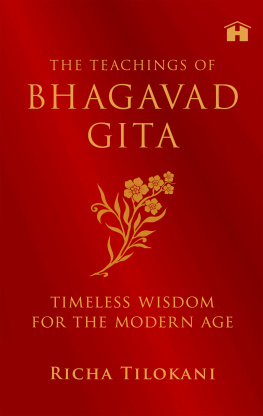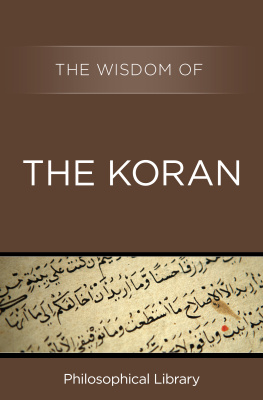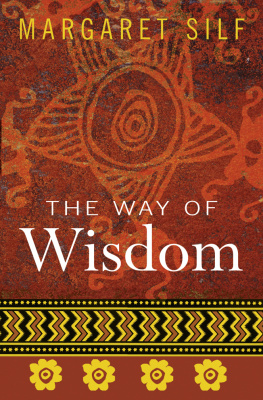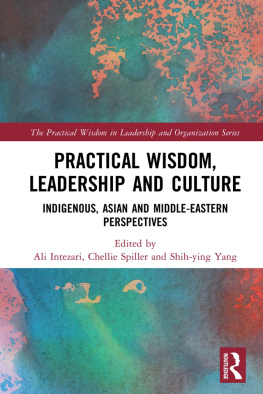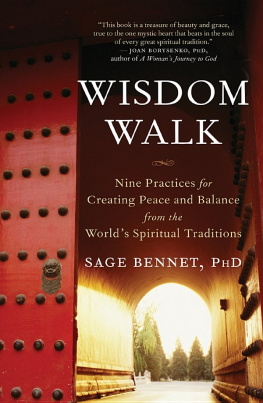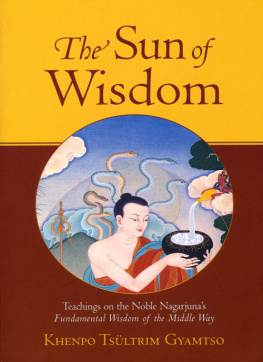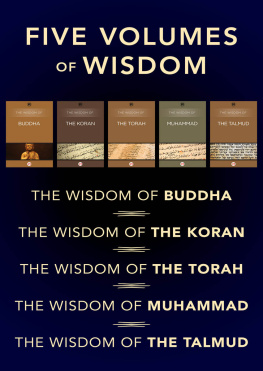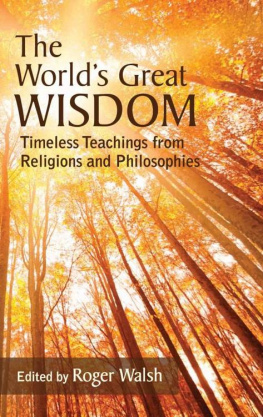The Worlds Great Wisdom
SUNY series in Integral Theory
Sean Esbjrn-Hargens, editor
The Worlds Great Wisdom
Timeless Teachings from Religions and Philosophies
Edited by
Roger Walsh
Published by State University of New York Press, Albany
2014 State University of New York
All rights reserved
Printed in the United States of America
No part of this book may be used or reproduced in any manner whatsoever without written permission. No part of this book may be stored in a retrieval system or transmitted in any form or by any means including electronic, electrostatic, magnetic tape, mechanical, photocopying, recording, or otherwise without the prior permission in writing of the publisher.
For information, contact State University of New York Press, Albany, NY
www.sunypress.edu
Production by Eileen Nizer
Marketing by Michael Campochiaro
Library of Congress Cataloging-in-Publication Data
The worlds great wisdom: timeless teachings from religions and philosophies / edited by Roger Walsh.
pages cm. (SUNY series in integral theory)
Summary: Surveying spiritual and philosophical traditions, revives the search for wisdom for modern timesProvided by publisher.
ISBN 978-1-4384-4957-9 (hardcover : alk. paper)
ISBN 978-1-4384-4958-6 (pbk. : alk. paper)
1. Wisdom. 2. Religions. 3. Philosophy. 4. Conduct of life. I. Walsh, Roger N., editor of compilation.
BJ1595.W84 2014
200dc23
2013006242
10 9 8 7 6 5 4 3 2 1
This book is dedicated to
Angeles Arrien and Tracy Gary
two wise women who have helped, healed, and benefited so many
Contents
Roger Walsh, MD, PhD, DHL
Rabbi Rami Shapiro, PhD, DDiv
Luke Dysinger, OSB, MD, DPhil
Reza Shah-Kazemi, PhD
Georg Feuerstein, PhD, MLitt
Ari Goldfield, JD
Livia Kohn, PhD
Michael C. Kalton, PhD
Robert McDermott, PhD
Roger Walsh, MD, PhD, DHL
Roger Walsh, MD, PhD, DHL
Introduction
R OGER W ALSH
Happy are those who find wisdom
She is more precious than jewels,
And nothing you desire can compare with her.
Get wisdom, get insight: do not forget.
Book of Proverbs: The Bible
What is wisdom and how can it be cultivated? These are two of the most important questions of human existence, yet they are tragically neglected in our contemporary culture. We are inundated with information and drowning in data, yet largely bereft of wisdom. As T. S. Eliot (1936) put it:
Where is the wisdom we have lost in knowledge?
Where is the knowledge we have lost in information?
This is a dangerous imbalance, and the fate of our species and our planet may well depend on giving wisdom a more central place in both our personal and public lives.
How did wisdom fade from our awareness? After all, for centuries it was revered as one of the greatest of all human virtues. Thousands of years ago, sages such as the Stoic philosopher Epictetus urged, Content yourself with being a lover of wisdom, a seeker of truth (Epictetus, 1995, p. 31), while Jewish proverbs exclaimed, Wisdom is the principal thing; therefore get wisdom (Proverbs 4:7).
Yet in recent centuries, wisdom slipped from Western awareness. Dazzled by the flood of scientific discoveries and technological breakthroughs, people dreamed that science would answer all questions and technology solve all problems. Science became scientism, technology the new savior, and knowledgenot wisdomthe key to living well.
Science and technology certainly delivered miracles. Yet in unwise hands, they also delivered unpredictable and unprecedented disasters, as the awesome power of modern technology dramatically multiplied the impact of human actions. As a result, populations exploded, pollution spread, resources were depleted, wars became genocidal, and the very health of the planet deteriorated.
Like the sorcerers apprentice, humankind now possesses enormous knowledge, awesome power, and little wisdom. And that is a potentially lethal combination. As Robert Sternberg, former president of the American Psychological Association, lamented, If there is anything the world needs, it is wisdom. Without it, I exaggerate not at all in saying that very soon, there may be no world (Sternberg, 2007).
Fortunately, recent years have seen the beginnings of a major reevaluation. Science is no longer worshiped as simply a savior, technophilia and technophobia jostle ambivalently, and wisdom is coming out of the closet. In society at large, there is talk of, for example, elder wisdom, native wisdom, and wisdom cultures.
Scientists have recently joined the quest. Though they long regarded it as too abstruse for investigation, research on wisdom is beginning. But though there is growing interest, the research is as yet preliminary and the information obtained is, by traditional standards, far from profound. The great questions of life and death that sages ponder are as yet unasked in modern laboratories. Of course, this is not surprising for a new research field. Moreover, science must measure and count. Yet what really matters cant always be measured, and what really counts cant always be counted.
If our contemporary culture has only a superficial understanding of wisdom, then the obvious question becomes, Where can we go for the deepest understanding of wisdom and of how to develop it? The answer is clear: to the worlds great religions and their accompanying philosophies and psychologies. For here, often hidden behind conventional beliefs and rituals, are preserved records of the insights of sages, the depths of existential exploration, and the heights of human understanding.
Of course, the worlds religions contain a curious mix of high and low, transcendence and nonsense, sagacity and stupidity. Yet the quest for wisdom has long been one of their central goals. For example, Jews and Christians claim that wisdom is more precious than jewels (Proverbs 3:15), while the Koran declares, [T]those to whom wisdom is given; they truly have received abundant good (Koran II: 269). In Hinduism the cultivation of wisdom constitutes a major spiritual path or yoga, while in Buddhism wisdom is regarded as the preeminent spiritual capacity.
But what we need above all else are methods to nurture wisdom. Fortunately, the contemplative core of the great religions contains these methods. Each tradition preserves methods for actually cultivating wisdom through systematic practices such as contemplation, meditation, yoga, and reflection on the great mysteries of life and death. These practices constitute a veritable art of wisdom or science of wisdom. At their best, therefore, the great religions contain both timeless treasuries of humankinds accumulated wisdom and effective methods for fostering it.
How can this treasury be brought to the contemporary world? One strategic method is to gather distillations of wisdom from each of the great religions and their accompanying philosophies and psychologies. In short, to create a book that offers summaries of each traditions sapiential principles and practices. These are the goals of The Worlds Great Wisdom .
To achieve these goals, I sought outstanding scholar-practitioners from each of the great religions, as well as from Western philosophy, to contribute chapters. These contributors are all both noted scholars with expert intellectual knowledge of their tradition as well as practitioners who use their traditions reflective and contemplative techniques themselves. They therefore have both intellectual and experiential expertise in their traditions. This direct experience and prolonged practice is essential, because if there is one thing on which the worlds wisdom traditions agree, it is that to fully comprehend deep wisdom requires careful preparation and practice.

